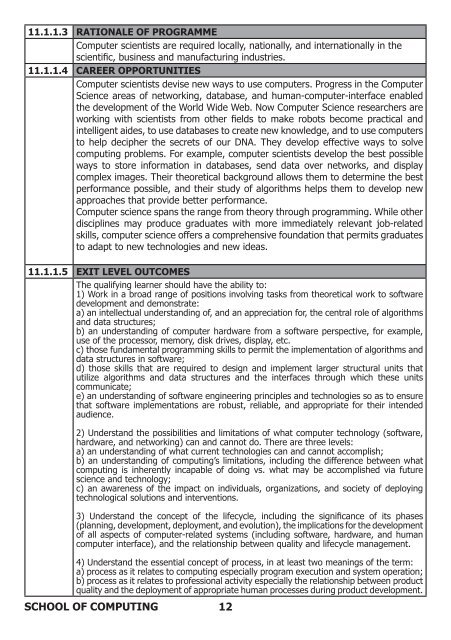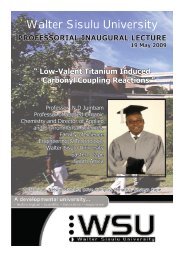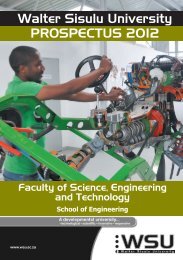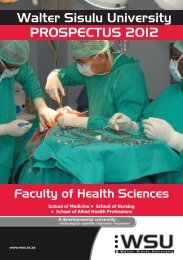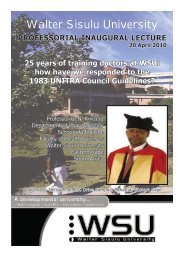School of Computing prospectus 2012 - Walter Sisulu University
School of Computing prospectus 2012 - Walter Sisulu University
School of Computing prospectus 2012 - Walter Sisulu University
Create successful ePaper yourself
Turn your PDF publications into a flip-book with our unique Google optimized e-Paper software.
11.1.1.3 RATIONALE OF PROGRAMME<br />
Computer scientists are required locally, nationally, and internationally in the<br />
scientific, business and manufacturing industries.<br />
11.1.1.4 CAREER OPPORTUNITIES<br />
Computer scientists devise new ways to use computers. Progress in the Computer<br />
Science areas <strong>of</strong> networking, database, and human-computer-interface enabled<br />
the development <strong>of</strong> the World Wide Web. Now Computer Science researchers are<br />
working with scientists from other fields to make robots become practical and<br />
intelligent aides, to use databases to create new knowledge, and to use computers<br />
to help decipher the secrets <strong>of</strong> our DNA. They develop effective ways to solve<br />
computing problems. For example, computer scientists develop the best possible<br />
ways to store information in databases, send data over networks, and display<br />
complex images. Their theoretical background allows them to determine the best<br />
performance possible, and their study <strong>of</strong> algorithms helps them to develop new<br />
approaches that provide better performance.<br />
Computer science spans the range from theory through programming. While other<br />
disciplines may produce graduates with more immediately relevant job-related<br />
skills, computer science <strong>of</strong>fers a comprehensive foundation that permits graduates<br />
to adapt to new technologies and new ideas.<br />
11.1.1.5 EXIT LEVEL OUTCOMES<br />
The qualifying learner should have the ability to:<br />
1) Work in a broad range <strong>of</strong> positions involving tasks from theoretical work to s<strong>of</strong>tware<br />
development and demonstrate:<br />
a) an intellectual understanding <strong>of</strong>, and an appreciation for, the central role <strong>of</strong> algorithms<br />
and data structures;<br />
b) an understanding <strong>of</strong> computer hardware from a s<strong>of</strong>tware perspective, for example,<br />
use <strong>of</strong> the processor, memory, disk drives, display, etc.<br />
c) those fundamental programming skills to permit the implementation <strong>of</strong> algorithms and<br />
data structures in s<strong>of</strong>tware;<br />
d) those skills that are required to design and implement larger structural units that<br />
utilize algorithms and data structures and the interfaces through which these units<br />
communicate;<br />
e) an understanding <strong>of</strong> s<strong>of</strong>tware engineering principles and technologies so as to ensure<br />
that s<strong>of</strong>tware implementations are robust, reliable, and appropriate for their intended<br />
audience.<br />
2) Understand the possibilities and limitations <strong>of</strong> what computer technology (s<strong>of</strong>tware,<br />
hardware, and networking) can and cannot do. There are three levels:<br />
a) an understanding <strong>of</strong> what current technologies can and cannot accomplish;<br />
b) an understanding <strong>of</strong> computing’s limitations, including the difference between what<br />
computing is inherently incapable <strong>of</strong> doing vs. what may be accomplished via future<br />
science and technology;<br />
c) an awareness <strong>of</strong> the impact on individuals, organizations, and society <strong>of</strong> deploying<br />
technological solutions and interventions.<br />
3) Understand the concept <strong>of</strong> the lifecycle, including the significance <strong>of</strong> its phases<br />
(planning, development, deployment, and evolution), the implications for the development<br />
<strong>of</strong> all aspects <strong>of</strong> computer-related systems (including s<strong>of</strong>tware, hardware, and human<br />
computer interface), and the relationship between quality and lifecycle management.<br />
4) Understand the essential concept <strong>of</strong> process, in at least two meanings <strong>of</strong> the term:<br />
a) process as it relates to computing especially program execution and system operation;<br />
b) process as it relates to pr<strong>of</strong>essional activity especially the relationship between product<br />
quality and the deployment <strong>of</strong> appropriate human processes during product development.<br />
SCHOOL OF COMPUTING<br />
12


